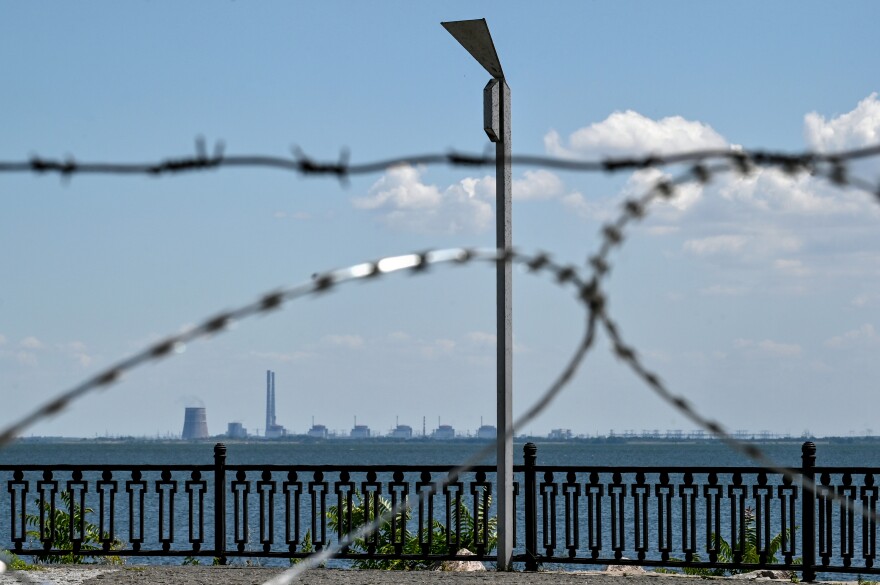NIKOPOL, Ukraine — The Zaporizhzhia nuclear power station sits a few miles across the river from this friendly, no-frills city of steel-pipe factories in south-central Ukraine. Tamara Korolkova, a 70-year-old grandmother, can see the plant's panorama on the horizon from the apartment building where she's lived for decades.
She used to admire its symbolism of a powerful independent Ukraine.
Now she says she has nightmares about the plant blowing up.
"All of us are just scared all the time," she says. "I'm old, I have diabetes. If anything happens, I will only have time to lie on the floor and close my eyes."
Russia occupied the nuclear power plant in March. But in the past few weeks, Russian forces have used the area around the plant to stage rocket and missile attacks on Ukrainian cities — including Nikopol. Locals say these rockets are hitting private homes practically every day. They're also worried that Russia might misfire artillery and instead strike a reactor or nuclear storage facilities at the plant, causing a meltdown and radiation poisoning.
"Our biggest challenge is that we can't predict what's going to happen tomorrow or even if there's going to be a tomorrow," says Nikopol's exhausted mayor, Oleksandr Sayuk. "We can't comprehend what Russia is trying to do there."

Ukrainian authorities accuse Russia of weaponizing the Zaporizhzhia nuclear power station, which is Europe's largest. They say Russia has turned it into a de facto military base. Ukrainian President Volodymyr Zelenskyy said in a video address posted online Saturday that Russia is using the plant to "blackmail our state and the entire free world."
More than 40 countries have asked Russia to withdraw its forces immediately from the plant. The United States, the European Union and the head of the United Nations want to create a demilitarized zone there.
The director-general of the International Atomic Energy Agency has also called to stop attacks around the site and says he wants to lead a mission of experts to assess any damage to the facilities.
Sayuk, the mayor, is hoping the U.N. and the IAEA can intervene. Meanwhile, he says, locals are either leaving the city or stocking up on potassium iodide pills to protect themselves against radiation.
"The plant used to be run by professionals, people we knew," says Natalia Horbolis, head of the executive committee of Nikopol's city council. "Now outsiders have taken it over, and we don't know what they are doing, and what it will lead to."
The increased shelling has hit private homes nearly every day, she says.
Dima Malichenko, 18, says he was sleeping in the hallway when a missile tore through his family's home — a house Malichenko's dad built himself.

"I sleep in the hallway so I can run downstairs to our homemade bomb shelter when an air raid siren goes off," he says. "But I slept right through the siren, and then the wall blocked the bomb shelter. I ran outside and didn't know what to do, so I huddled under a tree."
He received only a few cuts and bruises.
His grandfather, 60-year-old Oleksandr Pylypenko, says about a dozen neighbors are now helping to rebuild the house. "I didn't expect that," Pylypenko says, choking up, "but these days such acts feel very Ukrainian."

Across town, a crew is demolishing a partly collapsed apartment building that was recently hit. And at another apartment block, residents repair windows and doors damaged by a missile that left a huge crater on the street outside.
Halia Vasileva, 70, sweeps the broken glass from the sidewalks and the street. "We will clean up after every strike," she says, sighing. "But we can't clean up another Chernobyl."
As Vasileva sweeps, 35-year-old Anna Yaroshek arrives to check out the damage to her apartment. She says she and her husband rented a place a few miles out of the city when Russia invaded Ukraine.
"It was supposed to make us feel safer," she says. "We don't. I know what the consequences of nuclear accidents are."

Her father, Anatoliy, helped clean up nuclear waste after the Chernobyl disaster in 1986, when Ukraine was still part of the Soviet Union. He suffered from various types of cancer for years until he died five years ago.
"This radiation has no mercy," she says. "No pill can really protect us."
Hanna Palamarenko contributed reporting from Nikopol, Ukraine.
Copyright 2022 NPR. To see more, visit https://www.npr.org.
Loading...




